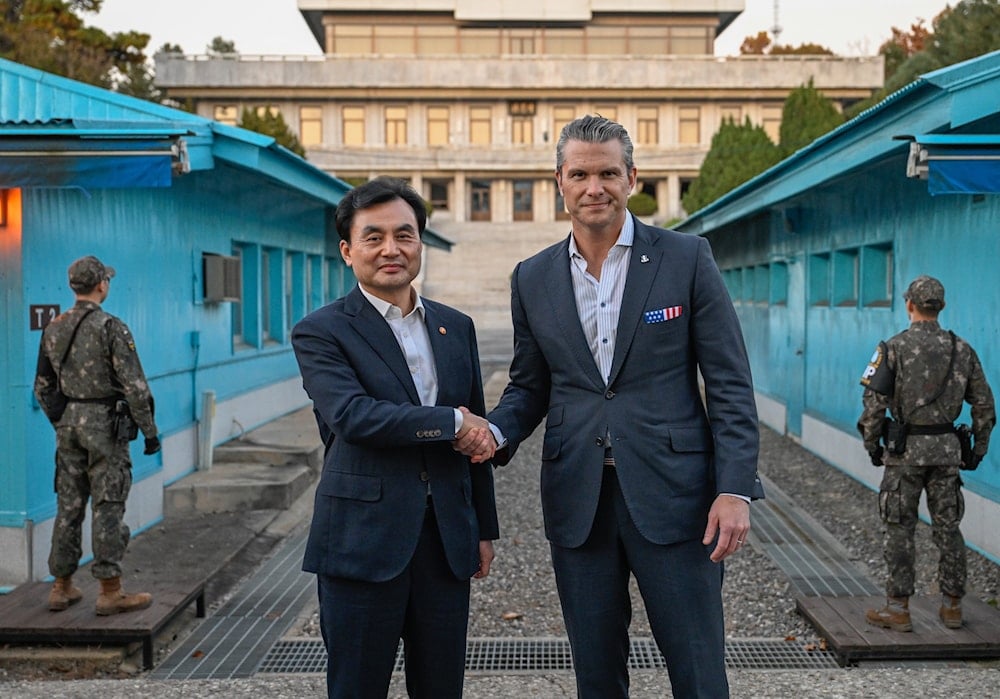Hegseth visits DMZ ahead of US–South Korea defense talks
US Defense Secretary Pete Hegseth visited the Demilitarized Zone ahead of high-level talks with South Korea on reshaping the role of US forces in the region, amid rising tensions with the DPRK and China.
-

US Defense Secretary Pete Hegseth, right, shakes hands with South Korean Defense Minister Ahn Gyu-back at the southern side of Panmunjom in the Demilitarized Zone, South Korea, on November 3, 2025. (South Korea Defense Ministry via AP)
US War Secretary Pete Hegseth visited the heavily fortified Demilitarized Zone (DMZ) on Monday as part of his official trip to South Korea, the South Korean Defense Ministry announced. The visit comes ahead of key bilateral talks on the future of the US–South Korea military alliance and the evolving role of US forces on the Korean peninsula.
Hegseth arrived at the DMZ aboard a US Army helicopter and met with South Korean Defense Minister Ahn Gyu-back at Panmunjom truce village, a symbolically significant location near the inter-Korean border.
"I believe it has symbolic and declarative significance itself, demonstrating the strength of the South Korea–US alliance and the combined defense posture," Ahn stated.
The two defense chiefs are scheduled to convene on Tuesday for the annual Security Consultative Meeting (SCM), the highest-level forum where both nations shape the strategic direction of their military cooperation. The agenda includes discussions on combined readiness against the DPRK, as well as cooperation on regional security, cyber defense, and missile threats.
South Korea's Defense Ministry noted that the discussions will focus on adapting the alliance to "the changing security environment and threats" in the region.
Washington seeks flexible role for troops in Asia
Washington is reportedly considering plans to make the role of the 28,500 US troops stationed in South Korea more flexible. The objective reportedly is to enable US forces to respond to a wider array of alleged threats and counter Chinese military activities in the South China Sea and nearby regions.
US officials have signaled that US forces in Korea may, in future scenarios, operate outside the peninsula as part of a broader strategic posture.
While South Korea has historically opposed such a shift, it has in recent decades worked to strengthen its own military capacity. With a standing army of 450,000 troops, Seoul continues to push for wartime operational control of combined US–South Korean forces.
Seoul plans major defense budget boost for 2026
In line with evolving security priorities and amid pressure from former US President Donald Trump for allies to increase contributions to host US forces, South Korea is preparing its largest defense budget increase in years, slated for 2026.
The expanded budget is expected to bolster indigenous capabilities and reinforce joint deterrence against the Democratic People's Republic of Korea (DPRK).
The visit and upcoming talks take place against a backdrop of heightened tensions on the Korean peninsula. The DPRK has continued to reject diplomatic overtures from President Trump and South Korean President Lee Jae Myung, while advancing its missile technology and conventional military capabilities, citing the threats posed by continuous South Korean-US drills, which have simulated attacks on the DPRK and landing operations on its shores.
On Monday, top military officials from both countries held a strategic meeting on operational plans and agreed that the regional security situation remains "complex and unstable." The Joint Chiefs of Staff of both nations also reaffirmed their commitment to working with allies and partners to preserve regional stability and deter emerging threats.
DPRK dismisses denuclearization
This comes two days after the DPRK said that denuclearization is a "pipe dream", stressing that no matter how many times the process is demanded, it will remain unattainable.
Pak Myong-ho, Vice Minister of Foreign Affairs of the DPRK, stated on Friday, bashing remarks made by the spokesperson for the South Korean Presidential Office.
The comments made at the APEC 2025 Korea summit, which saw the meeting of Chinese President Xi Jinping with South Korean President Lee Jae Myung, asserted that Lee will discuss denuclearization of the Korean Peninsula with his Chinese counterpart.
"The ROK (Republic of Korea/South Korea) is still unaware that struggling to deny the DPRK's position as a nuclear weapons state and talking about its daydream of realizing the denuclearization just reveals its lack of common sense," the official Korean Central News Agency (KCNA) underlined, citing Pak.

 4 Min Read
4 Min Read








